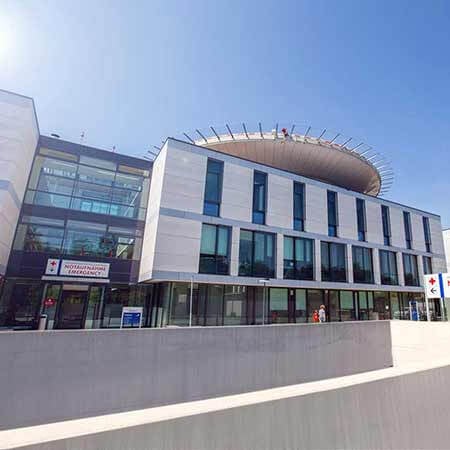Chronic lymphoblastic leukemia is usually a non-aggressive cancer that develops in older people. It can be treated with chemotherapy. Developed countries can also offer other, more effective, drug treatment options such as monoclonal antibodies and targeted therapy. Less commonly, stem cell transplantation and radiotherapy are performed.
Content
- Features of the treatment of chronic lymphocytic leukemia
- Chemotherapy
- Monoclonal antibodies
- Targeted therapy
- Stem cell transplant
- Radiotherapy
- Surgical treatment
- Leukapheresis
- Treatment in Europe with Booking Health at an affordable price
Features of the treatment of chronic lymphocytic leukemia
Chronic lymphocytic leukemia accounts for a third of all cases of leukemia. It does not develop as quickly as the acute form of pathology. With quality treatment provided, people with CLL (chronic lymphocytic leukemia) usually have a long life expectancy.
At the same time, the disease is considered incurable. There is no evidence that early initiation of therapy improves patient survival rates. Therefore, some patients do not receive treatment immediately. They are observed, and the treatment for chronic lymphocytic leukemia is carried out after the manifestation of signs of progression of the disease.
The treatment is preceded by a thorough diagnosis, since the therapeutic tactics as a whole depend on its results and the advisability of using certain drugs is determined. Doctors carry out a bone marrow biopsy. With genetic and molecular studies, they determine such important predictors of lymphocytic leukemia as deletions (lack of regions) on chromosomes 17 or 11, high levels of ZAP-70 and CD38 proteins.
Chemotherapy
For all patients with chronic lymphocytic leukemia, chemotherapy is the main treatment option. Doctors use a combination of several medicines that suppress cancer cells. Chemotherapy is carried out in cycles of 3-4 weeks. There are breaks between them so that the body can recover.
Most patients with chronic lymphocytic leukemia are elderly people. Chemotherapy may not be safe for them. In Europe, patients are carefully examined to make sure that it will be safe for their health to use standard doses of chemotherapy drugs. Age itself is not a contraindication to chemotherapy, but in the presence of concomitant pathologies, doctors can use more sparing treatment regimens.
To conduct chemotherapy for chronic lymphocytic leukemia, doctors use alkylating agents, purine analogs and glucocorticoids. They are often combined with monoclonal antibodies.
Monoclonal antibodies
In countries with advanced medicine, monoclonal antibodies are part of the standard treatment for chronic lymphocytic leukemia. Doctors use drugs that target the CD20 antigen. Some medications can be used as first-line therapy in addition to standard chemotherapy. They can also be applied instead of chemotherapy if it is contraindicated due to the patient's weakened health. Other monoclonal antibodies are prescribed as second-line medicines if chronic lymphocytic leukemia recurs after treatment.
Less commonly, other monoclonal antibodies can be used. These antibodies are targeting the CD52 receptors. Such medicines are used as second-line agents. They can also be applied as a standard treatment option for chronic lymphocytic leukemia with chromosome 17 deletion.
To treat chronic lymphocytic hairy cell leukemia, the medicines targeting CD22 are used. Doctors use an antibody-drug conjugate. It contains two components, namely, a substance that can bind to the CD22 receptor and a toxin that is delivered to the cancer cell and destroys it.
Targeted therapy
Targeted therapy is first-line treatment for patients with chronic lymphocytic leukemia. This means that the therapy is prescribed immediately after the detection of pathology, but not in case of its relapse or failure of other treatment options.
Doctors use BTK (Bruton's Tyrosine Kinase) inhibitors. They are taken in pills or capsules. The medicines are used as first-line therapy and for recurrence of chronic lymphocytic leukemia. The treatment is effective in patients with a chromosome 17 deletion. BTK inhibitors have few side effects, but they suppress bone marrow function. Blood contains too few red blood cells, platelets and leukocytes. Both immunity and blood clotting are impaired, which can adversely affect the health of patients.
PI3K inhibitors can be used only as second-line therapy. The drugs are prescribed if other treatments have failed. They are also taken in pills.
Another medication is a BCL-2 inhibitor. It blocks a protein in lymphocytic leukemia cells that prolongs their lifespan. Medicines in this group are often combined with monoclonal antibodies.
Stem cell transplant
With chronic lymphocytic leukemia, stem cell transplant can be performed less frequently than in acute. Typically, chemotherapy, monoclonal antibodies, and targeted therapy can successfully restrain the progression of the disease. In addition, mostly elderly people get sick, and they are not always healthy enough to perform this procedure, which is unsafe for health.
Nonetheless, in some cases, cancer returns. For repeated treatment of the disease, standard therapy options are not always effective. Failures are especially common in prognostically unfavorable types of chronic lymphocytic leukemia: with chromosome 17 deletion and TP53 mutation.
In theory, any, even the most aggressive, tumors can be suppressed with chemotherapy. This is purely a matter of dosage. But in practice, it will not work to increase the dose indefinitely, because healthy cells are also affected by chemotherapy, and primarily those that are quickly divided. The high-dose chemotherapy has high toxicity to the bone marrow, which dies and stops producing healthy blood cells.
The problem can be solved with stem cell transplant. Doctors carry out high-dose chemotherapy. It destroys not only the tumor, but also the patient's own bone marrow. To restore it, stem cells are injected into the blood, either the patient's own or donated ones. Previously, they were obtained from bone marrow, which is why the procedure is called bone marrow transplant. But in modern medicine, cells are more often taken from the patient's peripheral blood.
Depending on which cells are used for the transplant procedure, the transplantation can be:
- Allogeneic – cells obtained from a donor.
- Autologous – the patient's own cells.
Autologous transplantation is safer. The cells are definitely not rejected, and they do not cause a graft-versus-host disease. Nonetheless, the disadvantage of this method is that it is almost impossible to cure cancer. Together with stem cells, malignant cells inevitably enter the bloodstream, and thus they give rise to the growth of a new tumor. Therefore, sooner or later, cancer will recur.
When treating chronic lymphocytic leukemia, doctors often use allogeneic transplantation. It is better if there is a suitable donor from among the next of kin. If the patient does not have such a donor, he is selected in the database. The donor must be compatible for the main antigens. The more antigens match, the higher the chance of a successful outcome of the procedure.
Chronic lymphocytic leukemia can be cured with allogeneic transplantation. Firstly, the transplantation does not imply the transfer of malignant cells into the patient's blood. Second, after new bone marrow is formed, it attacks the remaining cancer cells more aggressively by activating the graft-versus-cancer disease.
Radiotherapy
While radiotherapy is one of the main treatment options for other types of cancer, it can rarely be used for leukemia. Radiotherapy does not affect the patient's survival rate. It is mainly used to relieve symptoms.
The three most common situations when doctors use radiotherapy for chronic leukemia are:
- The development of tumor foci, most often in the spleen, which squeeze the surrounding organs, for example, the stomach. They can block the passage of food, disrupt blood flow, and cause severe pain. Chemotherapy is effective in eliminating these tumor foci, but under the influence of drugs, they gradually regress. If the tumor needs to be reduced quickly, radiotherapy becomes an option of choice.
- Tumor foci in the bones. They cause a lot of pain. Bone irradiation aims to relieve pain.
- Prior to stem cell transplant. In recent years, doctors increasingly use only high-dose chemotherapy. Nevertheless, some patients also receive small doses of radiation to the whole body to reduce the risk of leukemia recurrence after bone marrow transplant.
Surgical treatment
Surgical operations for chronic leukemia can rarely be performed. They do not help cure this disease.
Sometimes doctors perform surgery to remove the spleen. It is required if the enlarged spleen presses on the surrounding organs, but it is not possible to reduce its size with the help of chemotherapy and irradiation.
The spleen is the organ responsible for the destruction of blood cells. Therefore, its removal has an additional positive effect on the clinical course of the disease. In hairy cell leukemia, splenectomy can sometimes be performed in order to increase the number of cells and reduce the need for blood transfusions.
Leukapheresis
In some patients, leukemia is diagnosed at an advanced stage, when too many abnormal cells appear in the blood. They thicken the blood, which can lead to respiratory failure and heart failure.
In such situations, chemotherapy helps to reduce the number of cells, but this happens gradually. The patient's condition improves significantly only a few days after the administration of the first dose.
To remove excess cells from the blood immediately, leukapheresis is performed. This is a method of extracorporeal (outside the human body) blood purification. A special apparatus takes leukocytes from it and returns the blood back to the vessels. The procedure is carried out within a few hours. For its implementation, the implantation of a central catheter is required. It is also required for the administration of cytostatics. To avoid having to insert a catheter into the subclavian vein twice, leukapheresis is usually conducted just before chemotherapy is started.
Treatment in Europe with Booking Health at an affordable price
To undergo treatment of chronic lymphocytic leukemia in one of the European hospitals, please use the services of the Booking Health company. On our website, you can find out the cost of treatment in different hospitals, compare prices and book a medical care program at a favorable price. The treatment of chronic lymphocytic leukemia in a European hospital will be easier and faster for you, and the cost of treatment will be lower.
Please leave your request on the Booking Health website. Our employee will contact you and provide a consultation about treatment in Europe. The Booking Health company will take care of the organization of your trip. We will provide the following benefits for you:
- We will select a hospital for treatment in Europe, whose doctors specialize in the treatment of chronic lymphocytic leukemia and show the best results.
- We will help you overcome the language barrier, establish communication with your attending physician.
- We will reduce the waiting time for the start of the medical care program and book a doctor's appointment on the most suitable dates.
- We will reduce the price. The cost of treatment in European hospitals will be lower due to the lack of additional coefficients for foreign patients.
- We will take care of all organizational issues: documents for entering the country, transfer from the airport, hotel, interpreting services, etc.
- We will prepare a program and translate medical documents. You do not have to repeat the previously performed diagnostic procedures.
- We will provide communication with the hospital after treatment in Europe.
- We will organize additional diagnostic examinations and treatment in a European hospital, if necessary.
- We will buy medicines abroad and forward them to your native country.
- We will help you keep in touch with the hospital and the doctor after treatment in Europe.
You will receive treatment from the best doctors in the world. The Booking Health employees will help reduce the cost of treatment and take care of all organizational issues, and you will only have to focus on restoring your health.
Authors:
The article was edited by medical experts, board certified doctors Dr. Vadim Zhiliuk and Dr. Sergey Pashchenko. For the treatment of the conditions referred to in the article, you must consult a doctor; the information in the article is not intended for self-medication!
Sources:
National Cancer Institute
Cancer Research Institute
Sience Direct










